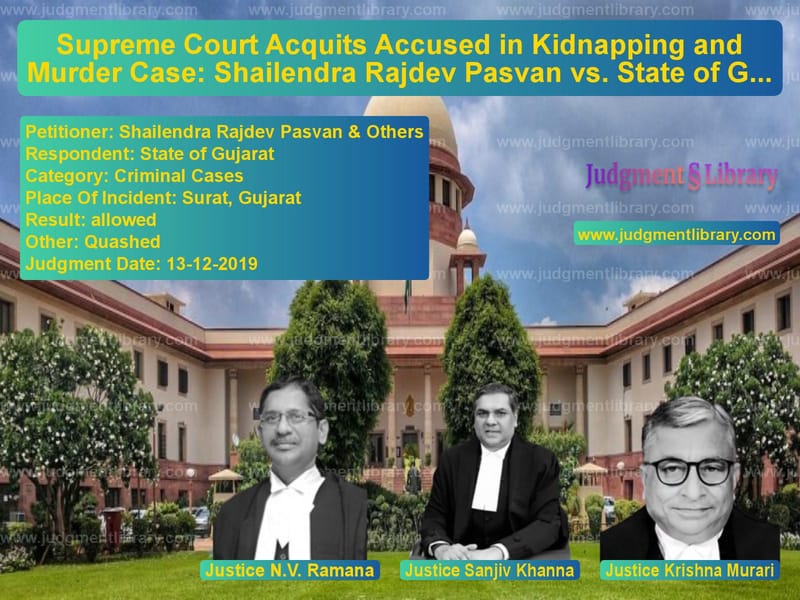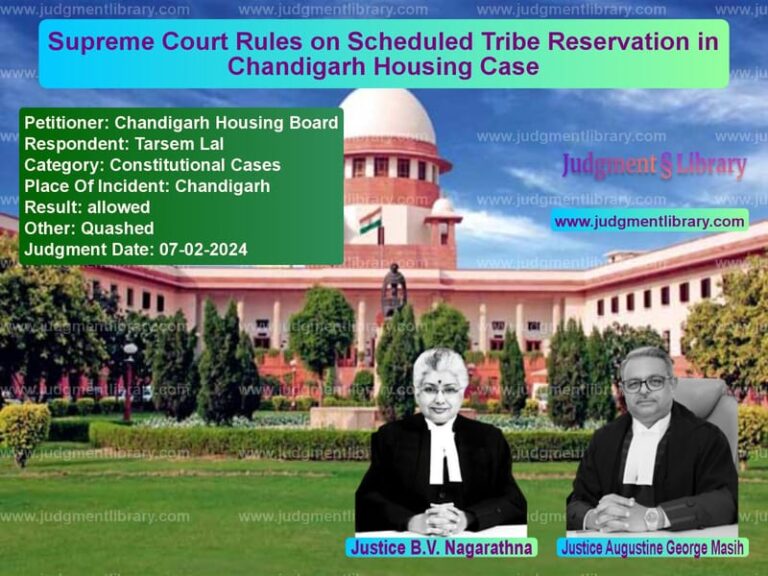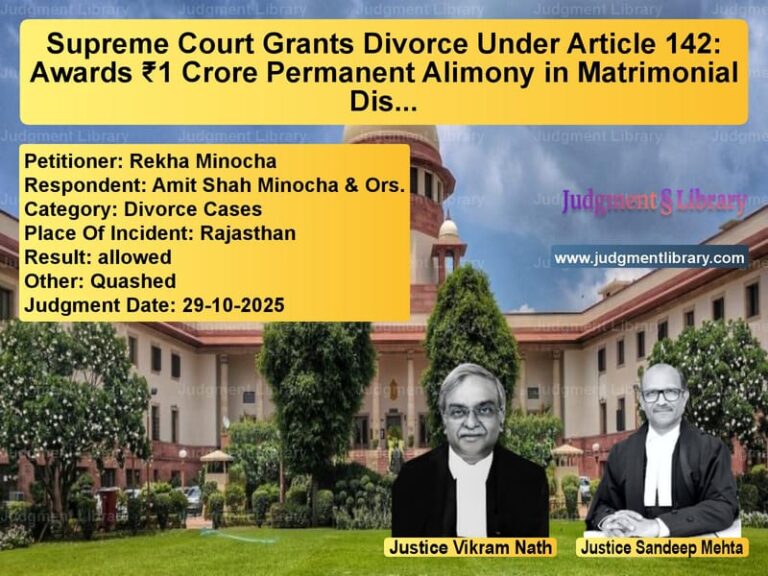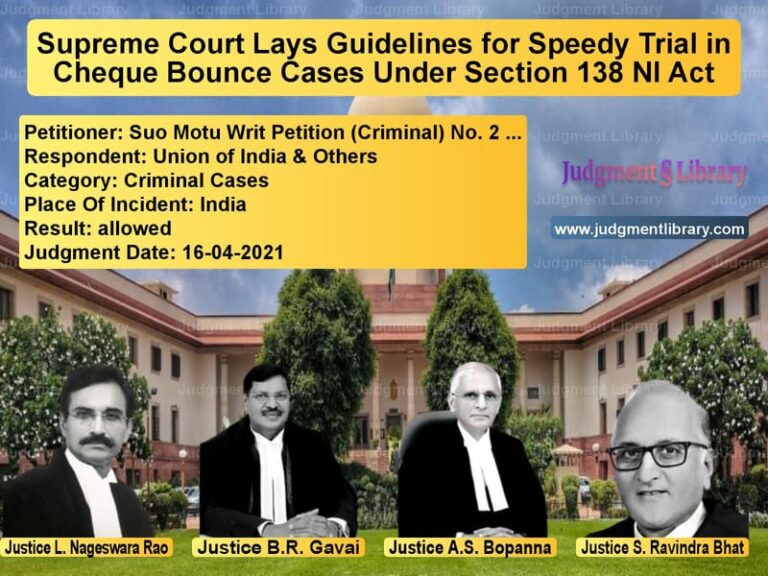Supreme Court Acquits Accused in Kidnapping and Murder Case: Shailendra Rajdev Pasvan vs. State of Gujarat
The Supreme Court, in Shailendra Rajdev Pasvan & Others vs. State of Gujarat, overturned the conviction of the appellants in a kidnapping and murder case. The case highlights the importance of proving guilt beyond a reasonable doubt and the necessity of corroborating circumstantial evidence.
Background of the Case
The case revolves around the disappearance and subsequent alleged murder of a 9-year-old boy, Arjun, in Surat, Gujarat. The complaint was lodged by his father, Paramhansh Mangal Yadav (PW-1), after Arjun went missing on 4th February 2001. Initially, the police recorded an entry in their diary and later registered a formal complaint on 14th February 2001.
According to the prosecution, the appellants kidnapped Arjun due to animosity between the complainant and one of the accused, Ramkeval Mutur Yadav. The case was primarily built on circumstantial evidence, including alleged extra-judicial confessions, last-seen theory, and discovery of a decomposed body.
Legal Issues Before the Supreme Court
- Whether the prosecution had successfully established a complete chain of circumstances leading to the guilt of the accused.
- Whether the alleged extra-judicial confession was admissible and reliable.
- Whether the circumstantial evidence, including the last-seen theory, was sufficient to convict the accused.
- Whether the Gujarat High Court erred in reversing the trial court’s acquittal.
Arguments by the Appellants
- The appellants argued that the prosecution failed to establish any direct evidence linking them to the crime.
- They contended that the extra-judicial confession was not voluntary and had multiple contradictions.
- The recovered decomposed body could not be conclusively identified as Arjun due to inconsistencies in the post-mortem report.
- The High Court had erroneously relied on weak circumstantial evidence and wrongly reversed the trial court’s acquittal.
Arguments by the Respondent (State of Gujarat)
- The prosecution relied on the last-seen theory, stating that witnesses saw Arjun with one of the accused before his disappearance.
- The extra-judicial confession was made before multiple witnesses and was crucial evidence.
- The High Court had thoroughly examined the evidence and found the accused guilty beyond a reasonable doubt.
- The sequence of events, including the discovery of Arjun’s body and forensic reports, pointed towards the guilt of the accused.
Supreme Court’s Judgment
The Supreme Court set aside the Gujarat High Court’s conviction, restoring the trial court’s acquittal. The Court observed:
“A conviction based solely on circumstantial evidence must establish an unbroken chain leading to the guilt of the accused, which the prosecution has failed to do in this case.”
The Court further ruled:
“Extra-judicial confessions must be scrutinized carefully. In this case, the inconsistencies and contradictions render it unreliable.”
The Supreme Court also highlighted discrepancies in the post-mortem report, which stated that the recovered body belonged to a 16-year-old, while Arjun was only 9 years old at the time of his disappearance.
Key Takeaways from the Judgment
- A conviction cannot be based solely on circumstantial evidence unless all links form an unbroken chain leading to the guilt of the accused.
- Extra-judicial confessions must be corroborated by independent evidence.
- Inconsistencies in forensic evidence weaken the prosecution’s case.
- Appellate courts must exercise caution while overturning trial court acquittals.
Final Decision
- The Supreme Court allowed the appeal and acquitted the appellants.
- The conviction by the Gujarat High Court was set aside.
- The appellants were ordered to be released immediately unless required in any other case.
Implications of the Judgment
This ruling reinforces the principle that circumstantial evidence must be compelling and complete to sustain a conviction. It emphasizes that courts should not rely on weak extra-judicial confessions without corroboration. Additionally, the judgment affirms that trial court acquittals should not be lightly reversed by appellate courts.
Petitioner Name: Shailendra Rajdev Pasvan & Others.Respondent Name: State of Gujarat.Judgment By: Justice N.V. Ramana, Justice Sanjiv Khanna, Justice Krishna Murari.Place Of Incident: Surat, Gujarat.Judgment Date: 13-12-2019.
Don’t miss out on the full details! Download the complete judgment in PDF format below and gain valuable insights instantly!
Download Judgment: Shailendra Rajdev Pa vs State of Gujarat Supreme Court of India Judgment Dated 13-12-2019.pdf
Direct Downlaod Judgment: Direct downlaod this Judgment
See all petitions in Murder Cases
See all petitions in Fraud and Forgery
See all petitions in Attempt to Murder Cases
See all petitions in Custodial Deaths and Police Misconduct
See all petitions in Judgment by N.V. Ramana
See all petitions in Judgment by Sanjiv Khanna
See all petitions in Judgment by Krishna Murari
See all petitions in allowed
See all petitions in Quashed
See all petitions in supreme court of India judgments December 2019
See all petitions in 2019 judgments
See all posts in Criminal Cases Category
See all allowed petitions in Criminal Cases Category
See all Dismissed petitions in Criminal Cases Category
See all partially allowed petitions in Criminal Cases Category







